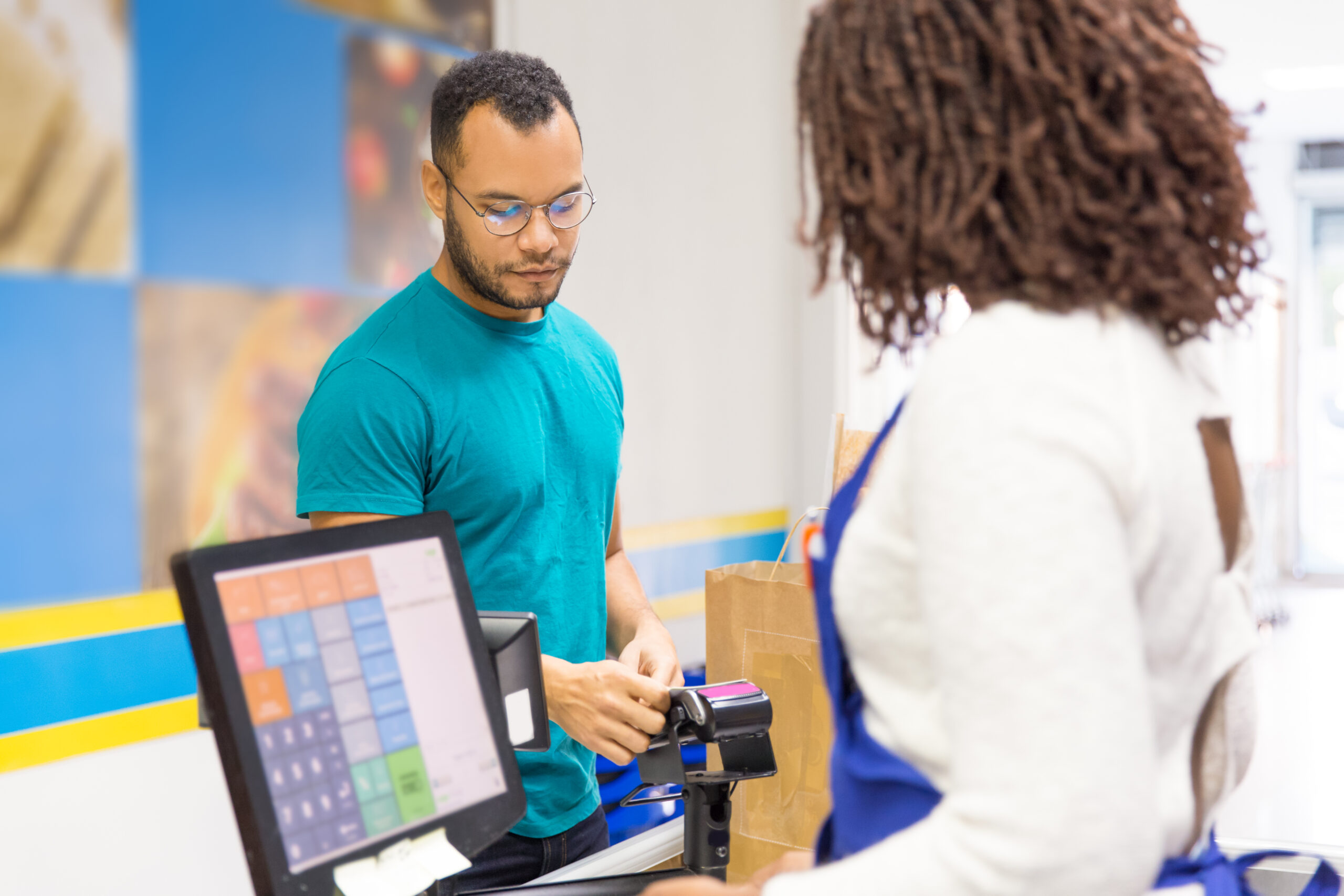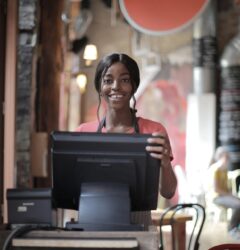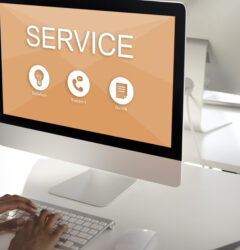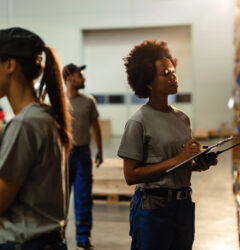30 May

The holiday season is fast approaching signifying the busiest time of the year for those in the restaurant business. People are not just loosening their belts to give way to all the delicious holiday dishes, but also their wallets. It’s the perfect time for restaurants to go full-throttle as the go-to venue for people to celebrate.
However, this doesn’t go for all in the industry. Without the right tools and automation to optimize your business performance, you may just be seeing yourself in another lost opportunity this holiday season. This is where a reliable POS system comes in very handy.
In an industry as expeditious and competitive as the restaurant industry, regardless of your business size, having a point of sale (POS) software system that can keep up is a game changer. Fortunately, modern POS software has evolved into a tool that makes every aspect of the restaurant business, from customer to user experience and administrative responsibilities, smooth-running and more efficient.
Foodservice businesses from food trucks to fast food joints to fine dining restaurants are making the most out of their POS as the primary operations hub for smooth-sailing operations.
What is a Restaurant POS?
A POS for your restaurant is a hardware and software system that work together to optimize workflow and transactions for the foodservice industry.
Most people hear the term restaurant point of sale (POS) and think of a cash register for customer transactions. Punch in order or purchase, accept payments, and buh-bye. Fortunately, today, a restaurant POS is capable of so much more than just taking orders! It can help you boost your sales, improve the guest experience and customer retention, and help you make smarter decisions to run your business.
A modern restaurant POS can help your business thrive in three main ways:
- Increase your sales
- Improve your guest experience
- Inform your business decisions
As you select the best POS for your restaurant, there are some crucial points to consider. Consider how a new system will affect your customers, staff, and profitability.
Pay close attention to the following areas where your POS can come into play:
1. Customer Experience
The goal of your business is to keep customers happy and keep them coming back for more. Perhaps even recommend it to their circles. A POS system significantly improves customer experience. Customers appreciate being able to seamlessly split checks, move their tab, switch tables, pay in different payment modes – and an added bonus, being able to make a payment right from their seat through the server’s tablet.
These are all made possible by a POS. With a sound POS system, you are rest assured that as it streamlines the process of taking orders to making payments, your customers are going to leave your store feeling satisfied. All thanks to the smooth and breezy transaction improving the overall customer experience.
2. Boost Customer Retention and Loyalty
A good loyalty program that rewards repeat customers can encourage them to keep coming back – and to spread the word about your business to their friends. With a POS, your loyalty program is integrated right into the system, tracking recurring customer engagements and creating a customer database you can use in other ways. (Hint: Email and text blast marketing, newsletters)
This is way better than a simple punch card that customers might lose or copy or not would want to carry around and occupy space in their wallets.
3. Speed
No matter what kind of restaurant you’re running, the speed and efficiency of your service are deemed of utmost importance. With a very limited time to maximize your opportunity to earn, moving through each step of the dining process as quickly as possible is vital. Of course, not to disregard offering a seamless experience for customers, wait staff, kitchen staff, and managers. The last thing you would want is a POS system stalling that process.
Remember, the more customers you serve, the more money you make.
Your POS can simplify the transaction process for your staff, which can help them move queues in the payment terminals more quickly. With a mobile POS, you can have one cashier take advance orders from a long line so that the kitchen or baristas can get started on them while the other cashier processes payment.
A mobile POS enables your servers to take tableside orders as well. Tableside ordering is a big deal because all your servers need to do is punch in the order once at the table instead of writing it down and running to a payment terminal. This significantly eliminates errors and speeds up service. A server’s product knowledge is more consistent because they can carry it around with them – no more running back to the kitchen with questions about ingredients or allergy alerts. It’s all right there.
Did you know that some restaurants have experienced sales increases of 20% or more after implementing tableside ordering?
4. Kitchen Display Systems
A great POS that will completely step up the way you run your restaurant is one that is equipped with a kitchen display system (KDS). As soon as your servers punch an order into the POS, this feature will automatically flash it right in the kitchen display system, where your kitchen staff can see everything at a quick glance.
This definitely eliminates some of the more frustrating elements of using the traditional order printer. Simplifying and automating communication between servers and kitchen staff will save you not only paper but staff time, reduce wastage, and decreases the chances of duplication of orders.
Kitchen Display System comes especially handy, especially in quick service environments where the business models are all centered on serving customers quickly. Imagine taking orders directly from table guests, which will automatically update back to the kitchen, no time wasted!
5. Inventory
With a simple inventory management system, Manage and keep track of your inventory right from your POS, so you are fully aware of when, what, and how much to order from your suppliers
POS systems let you track menu items as a whole or by counting individual ingredients as composite items. It should also notify you when you’re running low on your top sellers. You should be able to easily track your ingredients and products and monitor where all of it goes. Not only will you have great insight into what’s happening with your inventory, but you’ll be able to communicate better when it’s time to place an order or if it’s time to cut back on reordering certain items.
In addition, when you keep an eye on inventory costs, you’ll be able to spot price hikes and know when to renegotiate with your suppliers or find new ones.
6. Trigger A Push For Best-Selling Menu Items
Your restaurant POS can also tell you which items in the menu are your best sellers and give you the most profit! For instance, you might think your best dish is your Chicken Pesto Pasta because you get a lot of good online reviews on it. But what does the data reveal about how many are sold each day? How about the total cost to make each serving?
Your POS can reveal that while this dish sells well, it doesn’t do much for your profit because it’s expensive to produce. It may have a higher cost than other items on your menu.
Through your POS report, although it may not seem like a top seller, you could see that your pizza is your most profitable menu item because it has a marginally lower cost. A little push in promotions and recommendations from your servers can easily increase the number of these pizzas sold, which could boost your sales of a highly profitable item.
7. User Experience
Let’s face it. Today, even the youngest and oldest of ages are taking advantage of advanced software in some way (tablets, smartphones, smart TV, Smartwatches, etc.) Your staff too use cutting-edge software in their personal lives. Having to work at your restaurant and use poorly-designed, outdated, slow software, can quickly become a significant source of frustration, and worse, create a backlog in their service and performance.
A POS system that is intuitive, easy to learn, and navigate is essential for a better user experience. Your employees will be able to clock in and clock out right within the system, making it easy to check into work and get the ball running while improving cash drawer transparency and accuracy.
8. Reporting
A POS can help you view what was sold when it was sold, who sold it, and which payment method was used, all in real-time! Not only that, but it can also help you identify trends in past sales performance so you can make better decisions for your business.
You’ll be able to see which products sell best at what times and days and which ones are the most profitable. You’ll also have a sounder insight into how your staff perform, your actual labor costs, food costs, and the flow of new and regular customers.
Since your restaurant POS records every sale, it allows you to see extensive sales reports that give you a whole look at how your business performed that day. This way, you’ll always know if your business is in good shape or whether you roll up your sleeves on improving your revenue or strategies.
Your POS is a hub of information, collecting a wide variety of datasets that you can drill into and compare: month to month, year over year, or for special occasions like Christmas or Thanksgiving.
9. Owner’s Portable Accessibility & Control
As a restaurant owner with about a million tasks at hand every day, you can’t be physically present at your restaurant 24/7, but with an outdated desktop-only system, you might feel like you have to be. That’s an incredibly annoying problem when you just need to make a slight staff schedule adjustment or menu update, and you have to be physically present.
Thankfully, POS software can provide you with access to your data from any location, on any device. Whether it’s a menu update, a scheduling adjustment, or a sales issue, go for the POS that will let you handle it all in real-time, regardless of where you are.
10. Staff Restriction & Security
In an ideal world, there is no such thing as lying, cheating, and for businesses, employee theft. Ensure that customers have paid for any stock or inventory headed out the door.
Did you know that about 75% to 85% of all restaurant theft cases are committed by their own staff? Theft can account for up to 4% of your overall sales.
A restaurant POS can help counter employee theft and tighten security, increasing actual sales. First, A POS makes sure that all ordered items are tracked. For example, to get a burger from the kitchen with an extra pattie, your staff has to enter it into the POS.
Second, a POS has customizable security settings that enable restrictions of what a specific staff member can do within the system, based on their position. For example, a cashier might be unable to access how much is currently in the cash drawer, alter a bill, or give extra points to a customer without the manager’s consent.
When security settings are built into your system, that’s one less reason for significant anxiety and headache for you. Modern POS software will include automated data backups, customizable access controls, and data encryption to protect against employee negligence or theft. You’ll have peace of mind knowing your customer’s information, such as credit card numbers, is safe.




